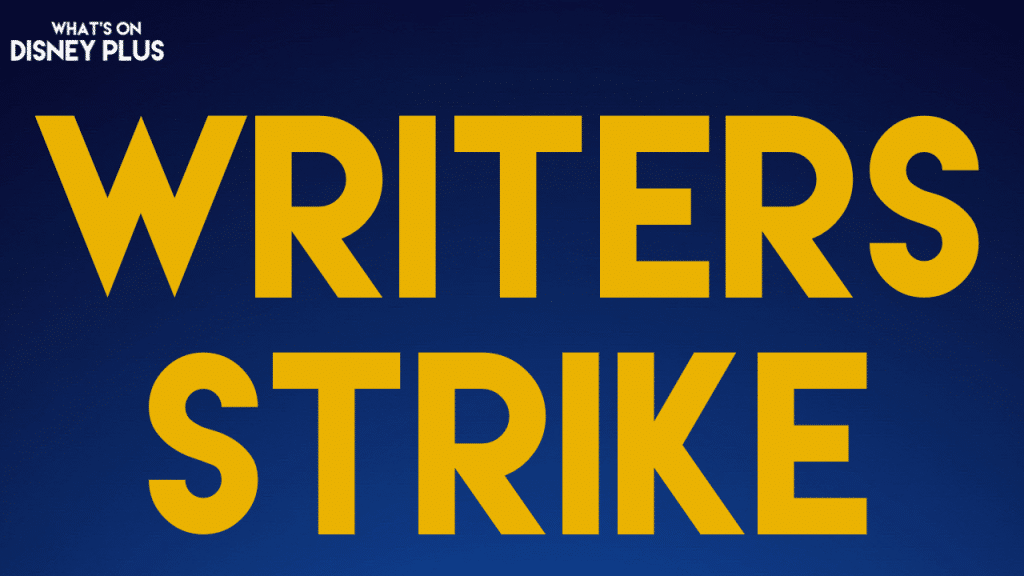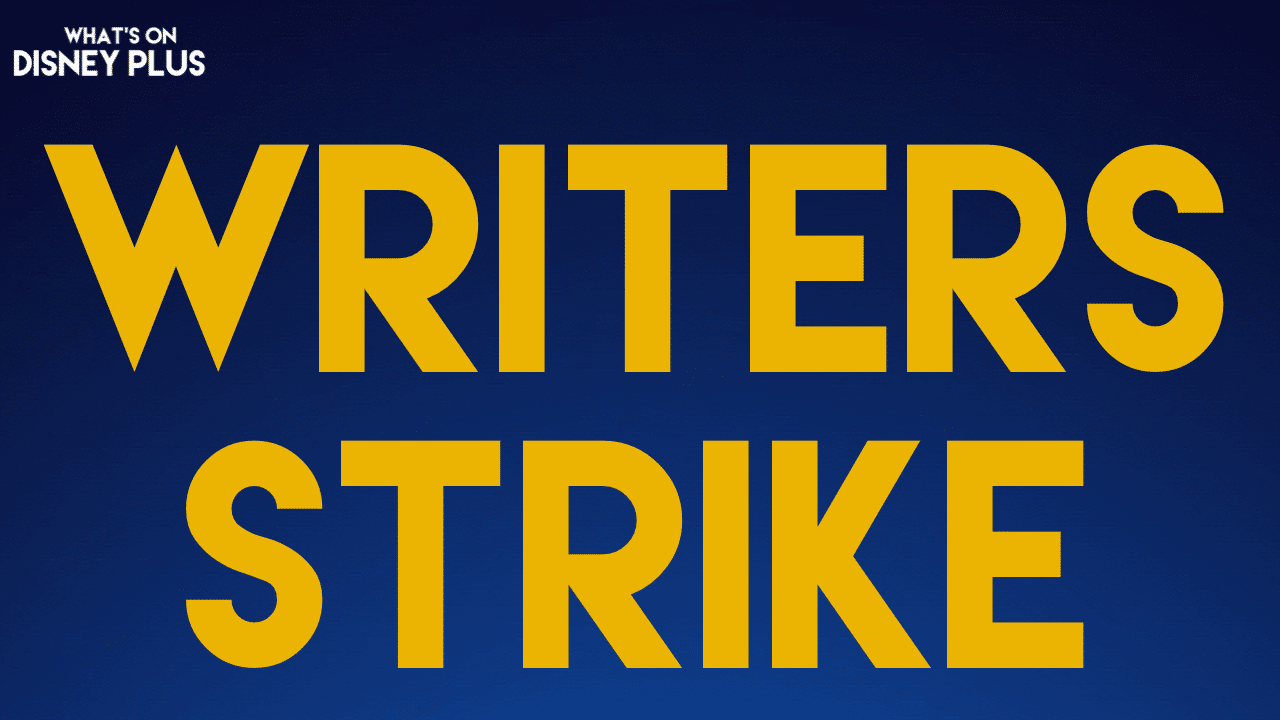
WGA Suggest Studios Split From AMPTP To Resolve Writer’s Strikes
It’s been 130 days since the Writer’s Guild Of America union went on strike, resulting in writing on films and shows ceasing, which has led to the development of many projects coming to a halt. Last month, there were several meetings between the AMPTP (the studios, which include Disney) and the union, but since then, negotiations have stalled.
Today, the WGA has provided an update on its side of the negotiations with the studios:
Dear Members,
We know that people are anxious for information about the status of the negotiation—and how difficult it can be to stay strong during periods of silence—which is only exacerbated by the companies’ recent attempts to make an end run around the negotiating committee and confuse the narrative. What follows is an update on where we are and how we got here. We share things we have not shared up until now, including conversations with individual executives that illustrate how some of the companies can already see a path toward making a deal, while other members of the AMPTP are not there yet.
In the 130 days since the WGA strike began, the AMPTP has only offered one proposal to the WGA, on August 11th . Since then, the companies have not moved off that proposal even though the WGA in turn presented our own counterproposal to the AMPTP on August 15th . The current standstill is not a sign of the companies’ power, but of AMPTP paralysis.
The studios and streamers bargaining together through the AMPTP have disparate business models and interests, as well as different histories and relationships with unions. They are competitors in all respects, except when they band together to deal with Hollywood labor. Through the AMPTP, these legacy studios and streamers negotiate as a united front which allows hard liners to dictate the course of action for all the companies. The AMPTP purports to represent all of these disparate corporate interests, but in practice administers a system that favors inflexibility over compromise, and sacrifices the interests of individual companies in reaching a deal. That regression to the hardest line has produced the first simultaneous strikes since 1960.
In contrast, during individual conversations with legacy studio executives in the weeks since SAG-AFTRA went on strike, we have heard both the desire and willingness to negotiate an agreement that adequately addresses writers’ issues. One executive said they had reviewed our proposals, and though they did not commit to a specific deal, said our proposals would not affect their company’s bottom line and that they recognized they must give more than usual to settle this negotiation. Another said they needed a deal badly. Those same executives—and others—have said they are willing to negotiate on proposals that the AMPTP has presented to the public as deal breakers. On every single issue we are asking for we have had at least one legacy studio executive tell us they could accommodate us.
So, while the intransigence of the AMPTP structure is impeding progress, these behind-the-scenes conversations demonstrate there is a fair deal to be made that addresses our issues. Given the outsized economic impact of the strikes on the legacy companies, their individual studio interest in making a deal isn’t surprising. Warner Bros. confirmed this in a public financial filing just this week.
We have made it clear that we will negotiate with one or more of the major studios, outside the confines of the AMPTP, to establish the new WGA deal. There is no requirement that the companies negotiate through the AMPTP. So, if the economic destabilization of their own companies isn’t enough to cause a studio or two or three to either assert their own self-interest inside the AMPTP, or to break away from the broken AMPTP model, perhaps Wall Street will finally make them do it.
Until there is a breakthrough, the companies and AMPTP will try to sow doubt and internal guild dissension. Keep your radar up. When the companies send messages through surrogates or the press about the unreasonableness of your guild leadership, take those messages as part of a bad-faith effort to influence negotiations and not as the objective truth.
The companies know the truth: they must negotiate if they want to end the strike. They may not like it-they may try to obscure it-but they know it. While they wrestle with that fact and with each other, they will continue attempting to get writers to settle for less than what we need and deserve, and encourage us to negotiate with ourselves. But we are not going to do that.
Instead, the companies inside the AMPTP who want a fair deal with writers must take control of the AMPTP process itself, or decide to make a deal separately. At that point, a resolution to the strike will be in reach.
We understand how painful this time is for everyone. We are all tired and hurting and scared. There is nothing wrong with saying so. The optimism for a return to negotiation has been met with a harsh reminder of how fraught this process can be. We share the frustration with how long the companies are prolonging the strike, and remain committed to negotiating a fair resolution as fast as possible.
In the meantime, as always, you can find your negotiating committee and board and council members out on the picket lines. When there is anything of significance to report, we will write again.
In solidarity,
WGA Negotiating Committee
The WGA have stated there is a disagreement within the studios over how to proceed and is trying to divide the studios, so a deal can made, since if one studio pulled away from the AMPTP, it could cause a domino effect. However, the AMPTP have also fired back with their own reply to this message:
The AMPTP member companies are aligned and are negotiating together to reach a resolution. Any suggestion to the contrary is false. Every member company of the AMPTP wants a fair deal for writers and actors and an end to the strikes, which are affecting not only our writer and actor colleagues, but also thousands of others across the industry.
That is why the AMPTP has repeatedly put forward offers that address major priorities of the WGA, including a last round of offers on August 17th and 18th. [See below] On many issues, AI among them, we are close. Our AI proposal has provided clear guarantees that the use of AI will not affect writers’ pay, credit or separated rights. We have asked the WGA to identify any remaining holes in the AI offer and it has not responded.
On the important topic of mandatory staffing, the WGA has remained entrenched in its original position, except for a single modest change in its position on staffing in development rooms. The WGA has achieved substantial gains for its members during this negotiation process and holds the power to move this negotiation forward by responding to the AMPTP’s most recent offers on key issues. The AMPTP, including all its member companies, remains eager to reach resolution.
TIMELINE OF PROPOSALS
-
April 14, 2023: AMPTP presented WGA with its Comprehensive Package Proposal, a 31-page document.
-
April 26, 2023: AMPTP presented WGA with its Revised Comprehensive Package Proposal, a 40-page document.
-
April 30, 2023: AMPTP presented WGA with its Second Revised Comprehensive Package Proposal, a 41-page document that addressed all items in negotiations.
-
August 11, 2023: AMPTP presented WGA with its Third Revised Comprehensive Package. Proposal, a 69-page document that addressed all items in negotiations.
-
August 15, 2023: WGA responded with a 4-page document with limited moves in a handful of areas.
-
August 16, 2023: WGA provided details of its revised written proposal on A.I.
-
August 17, 2023: AMPTP provided WGA a revised AI counterproposal, which focused on the key concerns that the WGA had expressed during discussion the previous day.
-
August 18, 2023: AMPTP offered further compromises to WGA’s August 15th response. WGA indicated it would respond the following week. AMPTP has not heard from the Guild since that time.
Recently, the studios have hired a new PR company to handle the strike action, which might be why this response has come much faster and also puts over their side, that they’ve been willing to give in to some more demands but want to talk. They also address the issue of a potential split between the studios. It’s not hard to believe that some executives are going to be much more inclined to want to get this strike over than others, and opinions are going to be different between the studios.
Should a studio split from the AMPTP to get a deal with the writers, it will also drastically impact the actor’s strike, as any studio leaving the group, would need to do the same with the actors, opening up a huge can of worms for the future. But it’s also worth noting that Netflix, Apple and Amazon operate very differently from the legacy studios like Paramount, NBC Universal and Disney, who also have linear and theatrical businesses.
With the summer and Labor Weekend over, hopefully, the WGA and studios can get back around the table and get this deal sorted, so writing can resume on new shows and films. It’s extremely frustrating for everyone to see how both sides are saying they are open to talk, but not willing to reach out to the other side to get this deal done. Hopefully, this latest update from both sides will get them back around the table to sort this out, as nothing is going to get sorted unless they do so.
What do you think of the latest writer’s strike issues? Let us know on social media!

